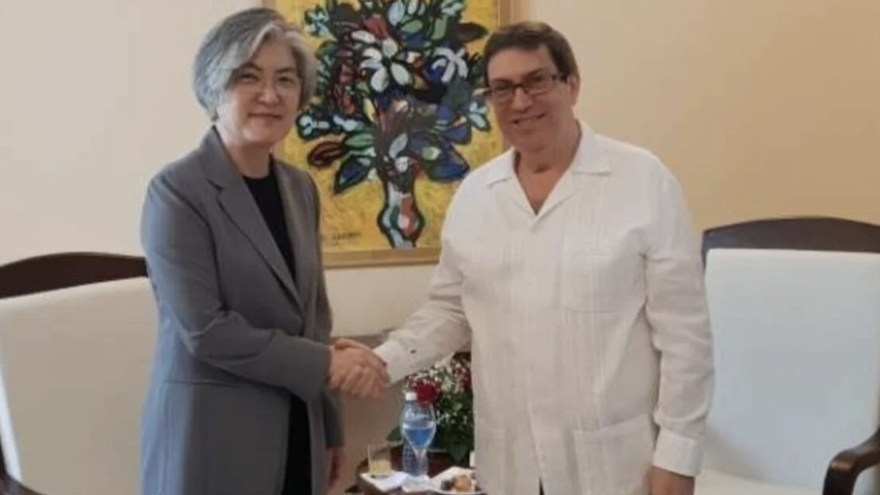
![]() 14ymedio, Havana, 15 February 2024 — “North or South?” The geopolitical knowledge of those who commented on Wednesday on the announcement of the Cuban Foreign Ministry about the re-establishment of diplomatic relations with South Korea was not enough to distinguish, by the official name, between the communist country of the north and the capitalist country of the south. However, Cuban insight knows no borders, and the forum organizers immediately glimpsed the opportunities for “business” and “investments” of “one of the most dynamic economies in Asia.”
14ymedio, Havana, 15 February 2024 — “North or South?” The geopolitical knowledge of those who commented on Wednesday on the announcement of the Cuban Foreign Ministry about the re-establishment of diplomatic relations with South Korea was not enough to distinguish, by the official name, between the communist country of the north and the capitalist country of the south. However, Cuban insight knows no borders, and the forum organizers immediately glimpsed the opportunities for “business” and “investments” of “one of the most dynamic economies in Asia.”
Among those who asked Cubadebate and the Ministry of Foreign Affairs for the brief message — just eight lines to announce a radical change in 65 years of foreign policy that does not even mention the “impact” of the agreement or its “historical background” — there were those who did not overlook a key element: the implications of the announcement for Cuba’s relations with North Korea. The comments, converted into brief reflections of geopolitics, analyzed the possible attitude of the allied country of Havana towards Cuba’s pact with the “number one enemy” of Pyongyang.
Relations have been maintained with North Korea since 1960, and the country has been a great ally of Havana
On the one hand, users said, relations have been maintained with North Korea since 1960, and the country has been a great ally of Havana, a link that “must be respected.” On the other hand, the most pragmatic asserted, “the Democratic People’s Republic must understand that it is an inalienable right of our country to open up to relations with all nations” and, in this case, with one of the most important in the world in terms of technology. Something that “maybe we can take advantage of economically.”
Others even went a step further, and asked why the regime does not open up to Israel or Taiwan if, in short, links are maintained with South Korea’s main “sponsors,” the United States and the United Kingdom.
The diplomatic link between Seoul and Havana was interrupted in 1959 after the arrival of Fidel Castro, who never resumed relations with the Asian country. As for North Korea, just a year later, in 1960, both countries exchanged ambassadors.
Despite the fact that diplomatic relations were suspended, the rapprochement between Cuba and South Korea coincided, in 2015, with the thaw between Washington and Havana, when several economic exchanges in technological and energy matters began, which were limited by the lack of a favorable diplomatic scenario.
In 2022, for example, according to data provided by the Ministry of Foreign Affairs of South Korea, the country exported goods to Cuba for a value of 14 million dollars and imported goods for 7 million. Likewise, before the pandemic, about 14,000 South Korean citizens traveled to the Island every year, and another 1,100 descendants of Koreans who migrated during the Japanese occupation (1910-1945) reside there. All of them, the Ministry explained, need “systematic consular assistance.”
Until now, explains the Seoul Foreign Affairs statement, Cuba was the only Government of the continent with which they did not maintain links
Until now, explains the Foreign Affairs statement of Seoul, Cuba was the only Government of the continent with which they did not maintain links despite the fact that “the two countries have expanded cooperation focusing on non-political fields such as culture, human exchange and development cooperation. In particular, it is considered that the dissemination of a friendly awareness between the two peoples through the recent active cultural exchange contributed to the establishment of diplomatic relations between the two countries.” This is intended to be maintained, ignoring the uncomfortable neighbor of the north.
Two examples of these relations in “non-political camps” are the purchase by Havana of the Korean ferry Perseverancia, which makes the route between the Isla de la Juventud and Surgidero of Batabanó (Mayabeque), and the aid worth $200,000 in medicine and hygenic material sent by Seoul after the explosion in 2022 of the Matanzas supertanker base.
In this sense, the role of each country is very clear, and the atmosphere during the restoration of relations by the diplomatic missions of Seoul and Havana at the United Nations on February 14, as a Cubadebate commentator assures, “could not be more loving.”
Translated by Regina Anavy
____________
COLLABORATE WITH OUR WORK: The 14ymedio team is committed to practicing serious journalism that reflects Cuba’s reality in all its depth. Thank you for joining us on this long journey. We invite you to continue supporting us by becoming a member of 14ymedio now. Together we can continue transforming journalism in Cuba.
